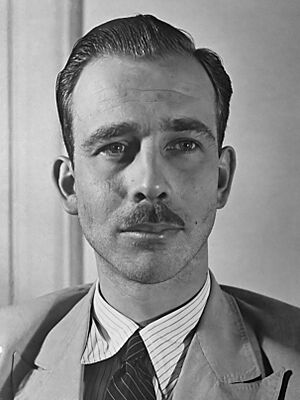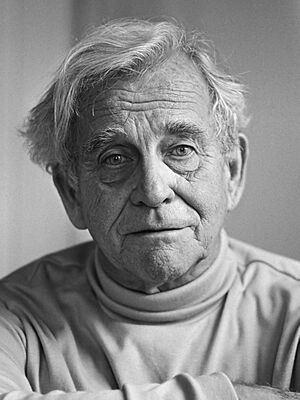Jan de Hartog facts for kids
Quick facts for kids
Jan de Hartog
|
|
|---|---|

De Hartog in 1943
|
|
| Born | April 22, 1914 Haarlem, Netherlands |
| Died | September 22, 2002 (aged 88) Houston, Texas |
| Pen name | "F. R. Eckmar" (used infrequently) |
| Occupation | Novelist and playwright |
| Nationality | Dutch |
| Genre | Non-fiction, Creative non-fiction, and fiction |
| Subject | (primarily) Seafaring stories |
| Notable works |
|
| Notable awards |
|
| Spouse | Marjorie de Hartog |
| Signature | |
 |
|
Jan de Hartog (April 22, 1914 – September 22, 2002) was a Dutch writer. He wrote many plays and novels. In the early 1960s, he moved to the United States and became a Quaker, a type of Christian.
Contents
Jan de Hartog's Early Life
Jan de Hartog was born in 1914 in Haarlem, Netherlands. His father, Arnold Hendrik, was a minister and theology professor. His mother, Lucretia, taught about old religious ideas.
When he was 10, Jan ran away to work as a cabin boy on a Dutch fishing boat. His father brought him home. But at age 12, Jan ran away again to work on a steamer in the Baltic Sea.
At 16, he went to a special school in Amsterdam to train for the Dutch merchant navy. He also shoveled coal at night for the Amsterdam Harbour Police until 1932.
Later, he worked as a skipper on a tour boat in Amsterdam. During this time, he wrote mystery stories. These stories featured Inspector Gregor Boyarski of the Amsterdam Harbor Police. He used the pen name "F. R. Eckmar."
Jan de Hartog started his theater career in the 1930s. He acted in and wrote a play at the Amsterdam Municipal Theater.
Jan de Hartog During World War II
In May 1940, Jan de Hartog published his book Hollands Glorie (Holland's Glory). This was just 10 days before Nazi Germany invaded the Netherlands.
The novel was about the lives of sailors on ocean-going tugboats. These tugboats rescued large ocean liners. The book quickly became a bestseller in the Netherlands.
De Hartog joined the Dutch resistance movement. The Nazis pursued him, so he had to hide in Amsterdam in 1943. He then managed to escape to England. His book became the most popular novel in the Netherlands during the war.
In 1943, he joined the Netherlands merchant navy as a correspondent. He even served as a ship's captain. For his work during the war, he received the Netherlands' "Cross of Merit."
De Hartog's experiences at sea inspired some of his books. These include The Captain and Stella. Stella was later made into a movie called The Key. It starred famous actors like Sophia Loren and William Holden.
Jan de Hartog's Postwar Writing
In 1947, Hollands Glorie was translated into English as Captain Jan. De Hartog stayed in the United Kingdom and began writing his books in English. His first English book was The Lost Sea (1951). This book was a fictional story based on his own experiences working on ships.
In 1952, he visited New York. There, he discovered a play he had written while hiding during the war. He had sold the rights to it while in England. The play was called The Fourposter. De Hartog won a Tony Award for Best Play for it. This was at the 6th annual Tony Awards Show. Columbia Pictures made The Fourposter into a movie. It starred Rex Harrison and Lilli Palmer. The film was nominated for a Golden Globe and an Academy Award. In 1966, The Fourposter became a musical called I Do! I Do!
De Hartog and his wife turned a 90-foot Dutch ship into their home. They lived on it as a houseboat. In 1953, there were big floods in the Netherlands. Their houseboat, named The Rival, was used as a floating hospital. De Hartog wrote about this experience in his book The Little Ark.
Moving to America
In the 1950s, de Hartog brought The Rival to Houston, Texas. It traveled on the deck of a large cargo ship.
De Hartog lectured about playwriting at the University of Houston. During this time, he and his wife volunteered at Jefferson Davis County Hospital.
De Hartog wrote about the poor conditions at the hospital in his non-fiction book The Hospital (1964). The book caused a big reaction across the country. In Houston, almost 400 people volunteered at the hospital within a week of the book's release. It led to big changes in the city's healthcare for people who couldn't afford it. This led to the creation of the Harris County Hospital District. Even though the book was a national success, some people in Houston were angry about it. This made de Hartog and his wife move back to Europe.
In 1967, de Hartog wrote The Captain. This book showed his love for the sea again. It featured a main character named Martinus Harinxma, who was loosely based on de Hartog himself. Martinus first appeared in The Lost Sea (1951). The Captain was very successful. Martinus became a main character in several more books.
Before starting the second book in the Martinus series, de Hartog wrote about adopting his two daughters. They were orphans from the Korean War. This book, The Children, came out in 1969. In 1972, he wrote a fictional story about how the Religious Society of Friends (Quakers) began. This book was called The Peaceable Kingdom: An American Saga. It was nominated for the Nobel Prize. Eight years later, he wrote another Quaker novel, The Lamb's War (1980).
In 1985, Whittier College gave de Hartog an honorary Doctor of Humane Letters degree.
He published the next Martinus book, The Commodore, in 1986. At this time, he was living in England. This was followed by The Centurion (1989). This book explored dowsing, an interest he and his wife had.
In 1993, de Hartog and his wife returned to Houston. He wrote the last book in his Quaker series, The Peculiar People, in 1992.
De Hartog's last completed novel was The Outer Buoy: A Story of the Ultimate Voyage in 1994.
In 1996, de Hartog was honored as the "Special Guest" at the Netherlands Film Festival.
Jan de Hartog passed away in 2002 at the age of 88. His ashes were taken to sea on a tugboat called the SMITWIJS SINGAPORE. His wife, Marjorie, and his son, Nick, scattered his ashes at sea. Other family members spread flowers there too.
In 2007, Marjorie de Hartog edited a short story her husband had started. It was called A View of the Ocean.
Jan de Hartog's Books
Fiction Books
- The Lost Sea (1951)
- A Sailor's Life (1956)
- The Key (1957) (also published as Stella)
- The Inspector (1960)
- The Artist (1963)
- The Hospital (1964)
- The Captain (1967)
- The Children (1969)
- The Peaceable Kingdom: An American Saga (1971)
- The Lamb's War (1980)
- The Trail of the Serpent (1981)
- Star of Peace (1983)
- Het Helig Experiment (1983)
- The Commodore (1986)
- The Centurion: A Novel (1989)
- The Peculiar People (1992)
- The Outer Buoy: A Story of the Ultimate Voyage (1994)
- The Flight of the Henny
- The Call of the Sea
Short Stories
- Mission to Borneo (1957)
- Duel with a Witch Doctor (1957)
Non-fiction Books
- The Hospital (1964)
- A View of the Ocean (2007) (released after his death)
Movies and TV Shows Based on Jan de Hartog's Work
Movies
- The Four Poster (1952)
- Based on his play The Fourposter.
- Won an award at the Venice International Film Festival for Best Actress (Lilli Palmer).
- Nominated for a Golden Globe and an Academy Award for its camera work.
- The Key (1958)
- Based on his novel Stella.
- Starred William Holden and Sophia Loren.
- Won a British Academy Award for Best British Actor (Trevor Howard).
- The Spiral Road (1962)
- Based on his novel of the same name.
- Starred Rock Hudson and Burl Ives.
- Lisa (1962)
- Based on his novel, The Inspector.
- Also known as The Inspector in the United Kingdom.
- Starred Dolores Hart and Stephen Boyd.
- Nominated for a Golden Globe for "Best Picture – Drama."
- The Little Ark (1972)
- Based on his novel of the same name.
- Nominated for an Academy Award for the song "Come Follow, Follow Me."
Television Shows
- The Fourposter (Play on TV) (1955)
- Aired on NBC as part of the 'Producers' Showcase Series'.
- The Four Poster (1964)
- An Australian TV play.
 | James B. Knighten |
 | Azellia White |
 | Willa Brown |


